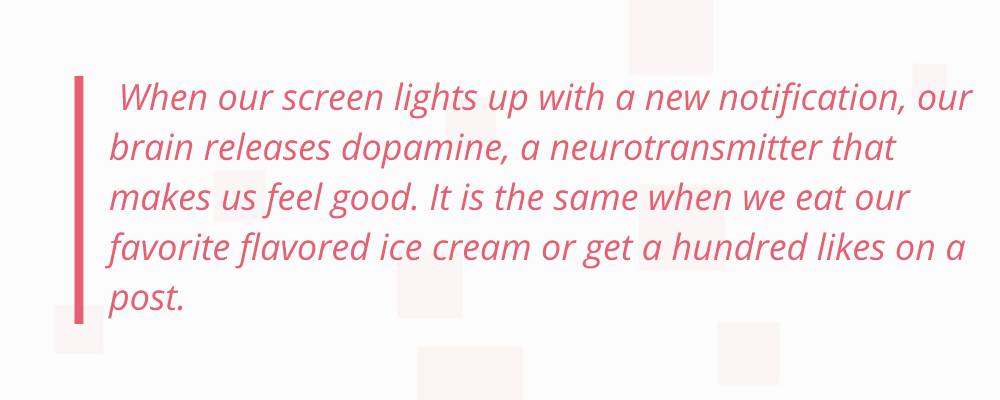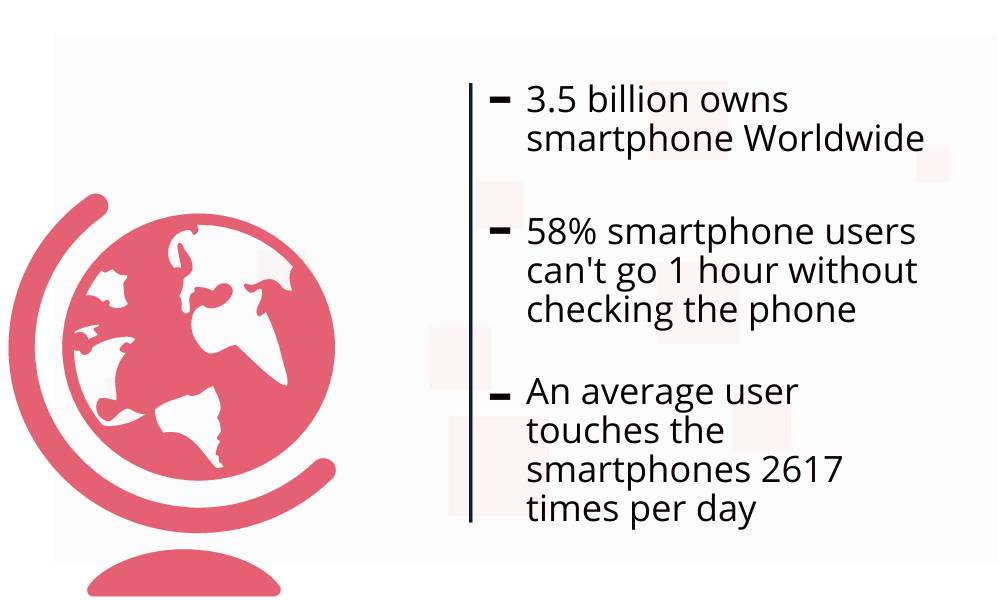Get insights.
Unlock value.
- 14-day free trial
- Set up in minutes
- No credit card required
Am I Addicted to My Phone?
Do you find yourself excessively checking your phone and obsessively refreshing your social media feeds? Do you feel the need to respond to every notification that sounds and lights up your device? Have you ever wished there was a simple way to limit the amount of time you spend on your screen and keep track of your digital usage?
This addiction to smartphones has grown so rapidly that the term ‘’nomophobia’’ was coined to describe a type of phone anxiety. Around the world, more than 2 billion people own smartphones, and it is projected that this number will rise to 3.4 billion by 2019 – almost double from 2013. From using smartphones to ordering food and making payments, it seems like we have no lives anymore and are addicted to our devices.
What is Nomophobia?
Nomophobia or NO MObile PHOne phoBIA is the modern-day phobia. We have heard many phobias in the past, like claustrophobia and acrophobia, but the current world population is experiencing one of the worst phobias they have ever seen.
I am saying it is the worst of all the other phobias; there is a certain percentage of people prone to be affected, but everyone has a good chance of getting it for nomophobia. Starting with children, teens, adults, and even elders, all have mobiles in their hands.
Nomophobia is the irrational fear of losing your phone or not having access to it; it has not been officially recognized as a psychiatric condition; there have been calls to include it in the Diagnostic and Statistical Manual of Mental Disorders, 5th Edition. But nowhere is it limiting the seriousness of nomophobia in a societal environment. It is still one of the major issues that need to be addressed immediately by all of us. This mobile phone addiction can be interlinked with gaming addiction, online shopping addiction, etc.
Effects of Mobile Phone Addiction on Mental health
Mobile phones reached us early in this century; from that start, they took a steep growth and reached a point where they became one of humankind's basic needs. Each of us is becoming more and more dependent on smartphones to carry our daily lives. Stated as a communication device, now became a multipurpose device to tune in to the digital world.

Social media has become the major reason behind a condition like Nomophobia, the notification, likes, and shares are the only source of happiness for our younger generation. Mobile phone addiction can be compared with chemical substance addiction; when our screen lights up with a new notification, our brain releases dopamine, a neurotransmitter that makes us feel good. It is the same when we eat our favorite flavored ice cream or get a hundred likes on a post. Dopamine reinforces (and motivates) behavior that makes us feel good, and in time, it turns into an addiction. Like other behavioral addictions, Nomophobia also affects mental health and causes various mental illnesses from anxiety, depression, etc.
Key characteristics of Nomophobia
A phobia is a fear of something; nomophobia is also characterized by specific fears linked with mobile phones' usage. In this instance, the fear is of being without a phone or being out of the reach of cell phone service.
Not communicating with others: People with nomophobia, though not talking with their close peers every day, communicating feel isolated or panicked as losing their connectivity with the world when not using mobile phones.
Not being able to access information: Google teaches more to our generation than the schools or universities. Most people have the habit of googling every piece of information they cross on a normal day. People with nomophobia exhibit the fear of not being able to access or search a piece of information.
A major discomfort: People with nomophobia consider not having mobile as losing a major comfort in life; they feel like giving up convenience in day-to-day activities.

Symptoms of Nomophobia
Nomophobia can be diagnosed with certain symptoms shown by individuals. The major symptoms are,
- The inability to turn off your phone.
- Constantly checking your phone for missed messages, emails, or calls.
- Taking your phone with you everywhere you go, even into the bathroom.
- Repeatedly checking to make sure that you have your phone.
- Fear of being without Wifi or being able to connect to a cellular data network.
- Stress over being disconnected from one’s online presence or identity.
- Using mobile phones as a way to cope up with bad moods or stress.
Apart from these symptoms, few questionnaires and assessment instruments are available to diagnose the severity of nomophobia.
Take the Nomophobia test to find it out. It is just a casual self assesment.
Treatment for Nomophobia
If you doubt you might have nomophobia, or you feel your mobile usage is causing problems in your day-to-day life, first take a self-administered test to examine your severity of nomophobia. Then accordingly, your treatment level varies. The treatment of nomophobia can be categorized into 3.
Exposure Therapy- When you are diagnosed with low-level homophobia, it can be treated with lifestyle changes and self-administered behavioral changes. In this way, you can start leaving your phone for a shorter period of time, then gradually increasing the time gap. This will ensure a steady improvement in your mental health and help you handle the panic easily.
Cognitive-Behavioral Therapy- CBT is a process that involves addressing the negative and irrational thought patterns that contribute to maladaptive behaviors. Your therapist will help you learn to identify these ways of thinking and replace these thoughts with more realistic and rational ones. For example, if you feel panicked while not checking your phone often, CBT will replace the thoughts with positive ones like ensuring that you will not miss anything even when you check your phone once in a while. This method may be used for someone diagnosed with a medium level of nomophobia.
Medications- Even though there is no particular recognized treatment method for nomophobia, a high-level severity of it is mostly affected by frequent anxiety attacks and depression. So physicians prescribe anti-depressants for patients with this level of severity.
Conclusion
Nomophobia might rise as our whole generation's biggest problem if not taken seriously at the early stage. The population of various western countries faces some serious health issues due to this mobile phone addiction. Self-discipline and self-control in the usage of mobiles is the need of the hour. You can set boundaries for the time you spend, try to find the balance between the real world and the virtual world, find ways to occupy you like a walk or cook something special for your family, or your favorite sport, do anything that gets you out of the mobile.
Get insights.
Unlock value.
- 14-day free trial
- Set up in minutes
- No credit card required
